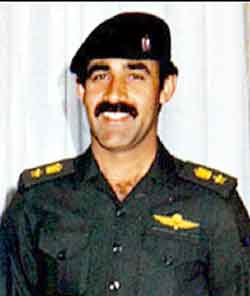On the basis of those intercepts and other recently obtained evidence, American intelligence agencies have shifted their view, and now say that Mr. Hussein and at least one of his sons, Qusay, probably are still alive and still in Iraq. But Mr. Mahmoud's claim that he and the sons had spent time after the war in Syria before being expelled by Syrian authorities adds a new element to that working theory. A senior Defense Department official declined today to provide any details about the newly energized search for Mr. Hussein and his sons, which others said was being carried out by Task Force 20, a secret military organization that includes Army and Navy counterterrorist personnel, and other special military teams. But the official made clear that the operations had been prompted by information provided by Mr. Mahmoud, who has been questioned over the last four days at an American military installation in Baghdad. "You follow up every lead that you can get, and when you get a person who's that high up in the regime, it's obviously in your benefit to move quickly on anything he tells you," the senior Defense Department official said. "Because when Saddam Hussein learns that his top deputy is in detention, he's going to try to erase any trail that he'd know of." While American forces were moving swiftly to check out leads provided by Mr. Mahmoud, the Defense Department official said American authorities were also treating his claims with some skepticism. "This is a person who is very close to Saddam Hussein, who was for many, many years, and who was part of the lies and deception for so long that you have to be very careful about what he tells you." Mr. Mahmoud, who ranked behind only Mr. Hussein and his sons in importance in the Iraqi government, has told the interrogators that during the weeks after the war with the United States he spent time in hiding with the former Iraqi leader himself. But Mr. Mahmoud told interrogators that the group split up at an unspecified time before he left for Syria with Uday and Qusay, according to the American officials. Along with the information about Mr. Hussein's sons, the American officials said, he was providing information about Iraq's suspected program of weapons of mass destruction, and he had contradicted evasive accounts from other former senior Iraqi officials now in American detention. The officials said they did not know or would not share the timeline that Mr. Mahmoud had provided for his whereabouts or those of Mr. Hussein and his sons, in the more than two months since the fall of the Iraqi government and the capture of Baghdad. Mr. Mahmoud, 46, who as personal secretary to Mr. Hussein controlled access to the Iraqi leader, was arrested on Monday in the vicinity of Tikrit, Mr. Hussein's hometown and stronghold. Bush administration officials, including Defense Secretary Donald H. Rumsfeld, had said publicly in the weeks after the war that at least a handful of senior Iraqi officials had fled across the border into Syria, and they called on the Syrian government to hand them over. Until now, however, there has never been any credible suggestion that those who fled to Syria might have included Mr. Hussein's sons. Syria has vociferously denied any knowledge of senior Iraqi officials taking refuge there. The Syrian leader, Bashar al-Assad, assured Secretary of State Colin L. Powell in Damascus last month that his government would not provide refuge to Iraqi fugitives. The whereabouts of Mr. Hussein and his sons have been a mystery since at least March 20, when the United States initiated the war against Iraq with a strike by cruise missiles and bombs on an installation in Baghdad where the top Iraqi leadership was believed to be hiding. American officials said afterward that they were uncertain whether Mr. Hussein and his sons had been there. The United States made a second attempt to kill them on April 7, with a bombing attack on a building in the Mansour district of Baghdad, where two intelligence sources said they were meeting. Together, those strikes prompted some optimism at the White House that Mr. Hussein had been killed. As late as April 4, Iraqi television broadcast two videotapes showing Mr. Hussein, including one in which he made reference to the downing of an American Apache helicopter on March 24, but American officials said it was unclear when the tapes were made. Within American intelligence agencies, the shift toward a view that Mr. Hussein and his sons are probably alive has been prompted in part by the failure of excavations of the two bombing sites to turn up DNA or other physical evidence of their bodies. It has also been prompted by interrogations of senior Iraqi officials now in American custody who have said Mr. Hussein and his sons were not at the sites of either of the American bombings. Apart from Mr. Mahmoud's uncorroborated claims, however, United States government officials have said the most compelling indications that Mr. Hussein is still alive are the intercepted communications among fugitive members of the Saddam Fedayeen, a paramilitary organization, and the Iraqi intelligence service, discussing the importance of protecting the former Iraqi leader's life. Today, a senior military officer said American intelligence operatives and military forces in Iraq were using the information to redouble the search for Mr. Hussein and his sons, or to find their remains if they are dead. "There is a level of great intensity to locate those individuals," the officer said. "Whether they are all still living or not, to identify where they are is of great interest." |
